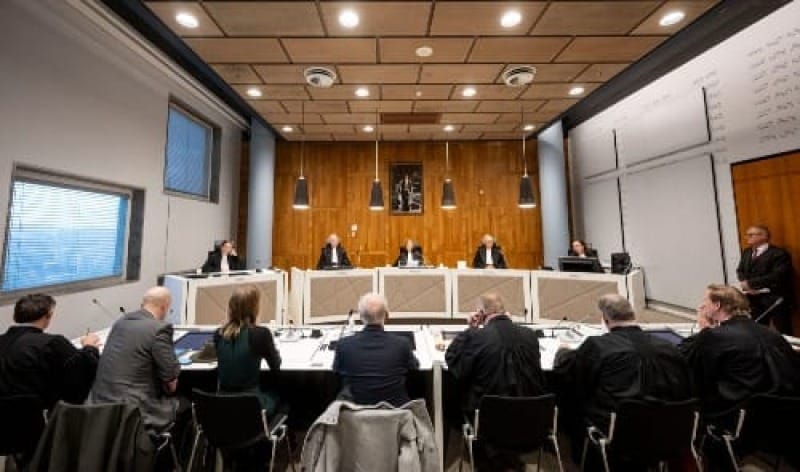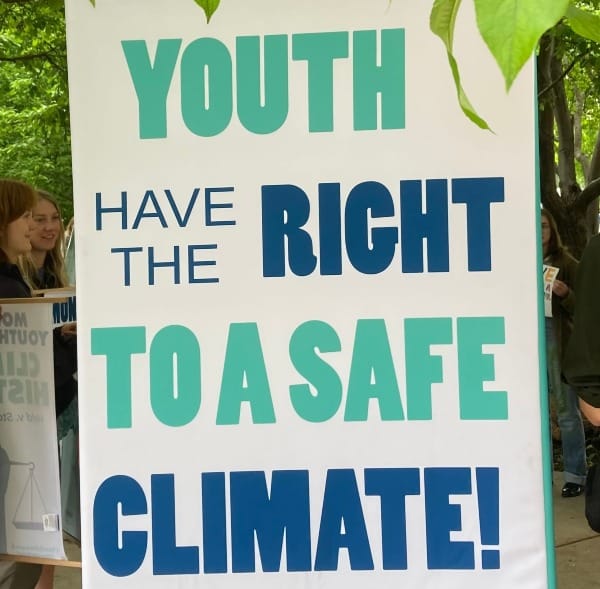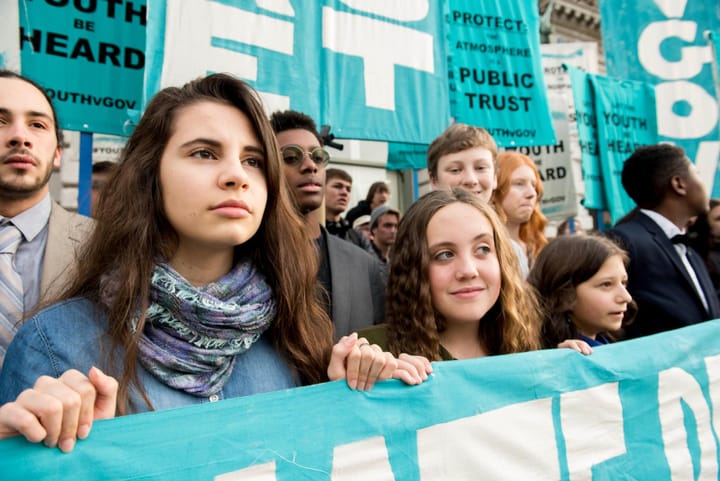Court Reverses Historic Climate Verdict Against Shell

Shell succeeds on appeal, but still has legal responsibility to limit its emissions.
In a clear setback for climate campaigners, a court in the Netherlands on Tuesday reversed a landmark 2021 judicial ruling requiring Shell, one of the biggest oil and gas producers in the world, to cut CO2 emissions across its entire business by 45% by 2030. Although the court determined that Shell has a legal duty to limit emissions and a responsibility to act to prevent dangerous climate change, the court ultimately ruled in Shell’s favor in dismissing the legal claims brought by Friends of the Earth Netherlands (Milieudefensie) and several other environmental organizations.
“This hurts,” Donald Pols, director of Milieudefensie, said in an initial statement reacting to today’s ruling from the Court of Appeal in The Hague. “At the same time, we see that this case has ensured that major polluters are not inviolable and has further fueled the debate about their responsibility in combating dangerous climate change.”
The decision in the pioneering climate lawsuit Milieudefensie et al. v. Shell follows a four-day hearing in April this year on Shell’s appeal of the Hague District Court’s historic judgment against the oil major. That ruling, issued on May 26, 2021, held Shell responsible under Dutch civil law and European human rights law for aligning its business with global climate goals and imposed a concrete emissions reduction obligation on the company. It was the first climate ruling of its kind in the world against a polluting corporation and marked a “watershed” moment in climate accountability litigation. Shell appealed the ruling, arguing it was unlawful and would not help the global effort to tackle the climate crisis.
The Court of Appeal’s verdict determined that Shell has responsibility to mitigate climate damage and reduce emissions, but the court could not clearly discern a proper level of reduction to assign. “There is currently insufficient consensus in climate science on a specific reduction percentage to which an individual company like Shell should adhere. Moreover, Shell is already working to reduce its own scope 1 and 2 emissions,” states a news release on the court’s website. The court also rejected the claim that Shell must reduce its scope 3 emissions, or emissions stemming from use of the company’s products, by a specified percentage.
In a statement responding to the verdict, Shell said it welcomes the court’s ruling. “We are pleased with the court’s decision, which we believe is the right one for the global energy transition, the Netherlands and our company,” said Shell CEO Wael Sawan.
Milieudefensie said while the court’s ruling is disappointing, there are some positive aspects.
“The court did clearly say that Shell has an obligation to reduce its emissions. It just didn’t attach a specific reduction percentage to that obligation. But that obligation is there, and that is very important for us to build on,” Sjoukje van Oosterhout, head of research for Milieudefensie, told Climate in the Courts. She also pointed to the court’s statement that investment in new oil and gas fields “may be at odds” with the global energy transition and the Paris Agreement objectives for limiting global temperature rise. “I think that’s a clear sign to any oil and gas company that’s still thinking of expanding,” van Oosterhout said.
“It is reasonable to expect oil and gas companies to take into account the negative consequences of a further expansion of the supply of fossil fuels for the energy transition also when investing in the production of fossil fuels. Shell’s planned investments in new oil and gas fields may be at odds with this,” the court said in its November 12 decision. The court also called the climate crisis “the greatest issue of our time” and said that “protection from dangerous climate change is a human right.” Companies like Shell may have human rights obligations to prevent significant climate harm, according to the court, which further held that such corporations “thus have their own responsibility in achieving the targets of the Paris Agreement.”
Climate lawyer Roger Cox, representing Milieudefensie in this case, said this determination signals a clear message of corporate responsibility. “This is a ruling for the entire business community and not just for Shell. The court makes it abundantly clear that not only countries, but also companies have a responsibility to reduce their emissions in line with the Paris Climate Agreement,” he said in a press statement.
Oil Change International, a climate research and advocacy group, said the court’s ruling provides grounds that campaigners and climate litigants can build upon. “As far as we know, this is the first case where a court has acknowledged that new investments in oil and gas are incompatible with international climate goals,” said Oil Change International’s Laurie van der Burg. “Our data shows Shell has over 800 new oil and gas projects in the pipeline that are all incompatible with the 1.5°C global temperature rise limit, and other Big Oil companies are on a similar course to destruction. That’s why the Shell case is part of a wave of recent climate cases to hold oil and gas companies – the climate arsonists fueling climate chaos – accountable for their role in driving the crisis.” A recent report from Oil Change International finds that at least 86 climate lawsuits have been filed against fossil fuel companies.
ClientEarth, a UK-based environmental law organization that brought a first-of-its-kind climate case in February 2023 targeting Shell’s board of directors, said Shell cannot evade its legal responsibility on climate action. “There is no doubt that Shell’s current strategy remains commercially and legally risky. Climate change and the energy transition present seismic risks to the company and society, and doubling down on fossil fuels that cannot be burnt in a carbon-constrained world only exacerbates those risks,” ClientEarth senior lawyer Paul Benson said. The organization’s case against Shell’s board has been dismissed by UK courts.
In its statement responding to the Court of Appeal ruling, Shell defended its corporate strategy, which has seen a slight scaling back in the company’s carbon intensity targets and in solar and wind energy investments. “Our target to become a net-zero emissions energy business by 2050 remains at the heart of Shell’s strategy and is transforming our business,” Shell’s Sawan said. “This includes continuing our work to halve emissions from our operations by 2030. We are making good progress in our strategy to deliver more value with less emissions.”
But Milieudefensie’s van Oosterhaut contended that Shell is not seriously transitioning its business. “Shell still is one of the biggest polluters worldwide. They don’t have an adequate plan to reduce their emissions to 2030, let alone to 2050,” she said. “We’ve seen a backslide in terms of their climate ambitions. So, I don’t think we would agree with Shell’s statement.” Van Oosterhaut noted that Shell’s overall emissions could actually increase in the coming years. “And the shocking thing is they admitted in court that could be the case,” she said.
Milieudefensie has not yet committed to lodging a final appeal, called cassation, to the Supreme Court, though that may be the next step. “We will take our time to carefully read [the court’s full decision] and discuss if we’ll take it to the Supreme Court or not,” van Oosterhaut told Climate in the Courts.
Pols said the organization will continue fighting to hold major polluters like Shell accountable. “One thing is clear: the fight against the big polluters is a marathon, not a sprint,” he said in a press statement. “We will continue in any case until all polluting companies stop causing dangerous climate change.”


